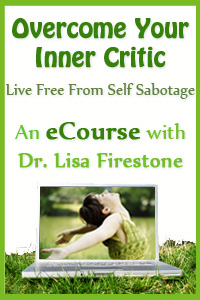 I wouldn’t belong to a club that would have me.
I wouldn’t belong to a club that would have me.
My boyfriend must be an idiot because he thinks I’m great.
When faced with an opportunity to imagine what my partner is really meaning to convey, I always assume the intention is to put me down.
Each response we make to the action of another requires us to first calculate the others’ intentions. This happens in a blink, a breath, the process occurring below the surface of our awareness. Our assessment is informed by the experiences we have had up to this point, most significantly, the atmosphere that permeated our lives while growing up.
The motivation we imbue upon another has a huge impact on the choice we make from the wide array of responses available to us. If someone bumps into us and we assume malicious intent, we respond one way, if we assume it is accidental, another. If we assume it resulted from someone being dazed or preoccupied, still another. The situation is the same, we have still been jostled, the squished toe still throbs; but we respond to the affront in varying ways–with anger or frustrated understanding or annoyance. And the difference between these makes a world of difference to our internal feeling state within a given day.
If we are not correctly gauging the motivations of others, we cannot have a genuine experience of them. This leads instead to a feedback loop – we respond emotionally, without questioning, to what we imagine the other’s intentionality to be, and we act toward the unwitting soul who engaged us as though our (perhaps skewed) perception were the truth. Accordingly, they then react to our reaction with denial, defensiveness, or responsive anger, thus closing the loop: We have been wronged, and the jerk won’t even own up to it!! Voila! We have created the world we suspected all along….we are being mistreated, put down, overlooked, slighted.
So how, then, does one go about correctly gauging the intentionality of another? The answer has hardly anything to do with focusing on trying to understand another person’s intentions, and almost everything to do with focusing on ourselves, and on any recurring themes that seem to have cropped up over the course of our lives. Do you chronically feel not good enough? Or, maybe, just a little superior? Not taken seriously? Easily taken advantage of? Underestimated? Disregarded? Do you have pieces of anecdotal evidence from your life that seem to prove that some theme like one of these is true about you?
Look closely, think about it. Because I will make a bet that whatever the theme is for you all but parallels the response you would typically make in relation to someone who, say, bumped into you and stepped on your toe, hard. Are you so inconsequential that you go that unnoticed? Are you so clumsy that you caused this embarrassment? Is that person an inconsiderate idiot? Or worse, have they done it on purpose? Do they just not care that they’ve hurt you?
Consider your life, where you have come from, what feelings rankled in you as you grew from childhood to adolescence. If you can tap into these emotional elements of your earlier reality, you may come to see that your knee-jerk reactions to others today draw responses from them that keep you reliving these themes, rather than living the reality that would come from actually looking into another person’s eyes and sensing their actual motivations.
Personal exchanges free of the emotional baggage of our past can be disarmingly, surprisingly, delightfully, devoid of any knee-jerk reactions; cynicism, fear, distrust, self-doubt, diffidence, etc, etc. Even on the simplest levels, they can clear the way for straightforward, human experiences to occur; the kinds of personal exchanges between people that are true and real and meaningful, whether momentarily between strangers, or during the long run in enduring relationships. This interjection of reality can cause us to reassess what we think we know about ourselves and our basic nature, and to reconsider what we think to be true about the basic nature of others as well.
In this day and age, people often seem to hold cynical, fast paced, surface-based caricatures of one another. We seem to have agreed upon, as a society, what “the poor,” “the rich,” “the religious,” “the non-religious,” and various other categories of people are like, what “they” value, what “they” do not value.
Let’s take a moment to breathe and open our eyes and slow down and try to actually see those around us. Our lives will be richer, more fertile, more abundant for it. And as for the twits who may actually be disregarding, insensitive, perhaps attempting to degrade us? Who cares? They are in a minority.
The atypical nature of this kind of incident will be offset by the new normal of eye contact, humor, and empathy in our encounters and exchanges with others; by the breadth and texture of our self-understanding; and by the authentic life with others we are now able to create based on these experiences.

